Dental implants are artificial tooth roots which are inserted in the jaw bone and used to replace missing teeth. An implant can replace one tooth or with only 4 implants in one arch all the upper or lower teeth can be replaced as 4 implants can support an entire arch of teeth.
3-4 appointments, 30-90 mins/appointment
The ultimate tool for total tooth replacement, and the only way to fight tooth loss, dental implants are artificial tooth roots that can house a crown, thus replacing all of the parts of a tooth, restoring normal chewing functions completely.
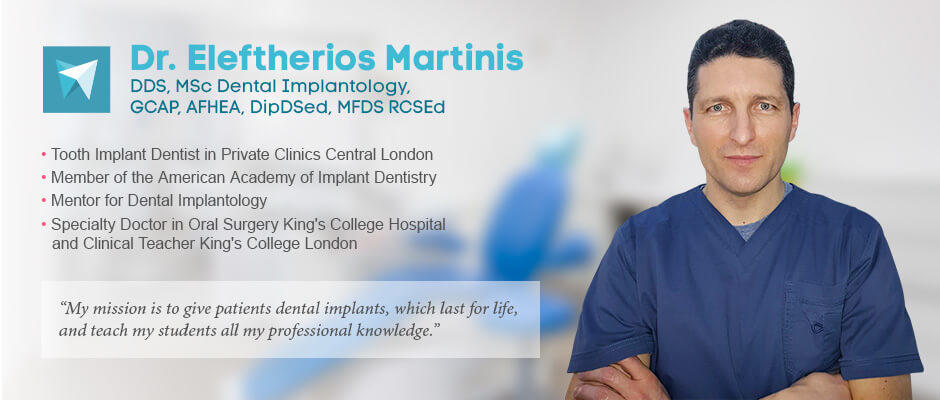
One of the main procedures that our dentistry prides itself on is dental implants. Dental implants are relatively new implements are the only way to truly replace missing teeth, and to replace every part of teeth that are no longer in the mouth. It is vitally important to replace missing teeth, otherwise the health of the rest of your teeth, jaw joints and mouth will be compromised.
If teeth are missing, the alveolus, that soft ridge of bone underneath the gums starts to deteriorate, leading to further tooth loss, and the cycle begins. To stop this cycle, artificial tooth roots called dental implants need to be inserted into the alveolus. Missing teeth can also lead to TMJ problems, back and neck pain, speech impediments and a whole slew of dental problems.
Dental implants, sometimes called tooth implants, are tiny titanium alloy screws that are drilled into the jawbone. Dental implants are artificial tooth roots that take the place of the missing tooth root and replace the entire tooth.
A dental implant is made of three parts: the actual dental implant that is drilled into the jawbone, an abutment, and a crown that goes on top to replace the visible portion of the tooth.
A dental implant thus replaces every part of the tooth and is anatomically the same as a real living tooth. Dental implants can revitalise your mouth by giving you back the proper chewing and biting functions of the tooth that was missing until then, and by helping you use all of your teeth again.
Dental implants are made of a hypoallergenic titanium alloy, and are not rejected by the body, so even people with metal allergies can get them. The insertion of dental implants is a 45 minute surgical procedure, and has a 98% success rate, so it is considered an extremely safe and routine oral surgical intervention.
There are many different sizes and shapes of dental implants that are available. The arrow shaped dental implant is usually used to replace front teeth or smaller teeth that did not have a lot of space, so they are narrow and go quite deep. There are also tiny mini dental implants that can be used in tight spaces, or more of them can be used to house big crowns meant for replacing large molars and back teeth used for chewing and grinding.
A typical dental implant can replace most teeth, but as we are all differently sized and shaped, so are the dental implants that are used to replace our teeth. We use Noble brand dental implants for a variety of reasons. These are the most readily available dental implants and the most versatile ones as well, as they come in so many different kinds. They are also one of the most reliable dental implants, and are the oldest brand of commercial dental implants available today.
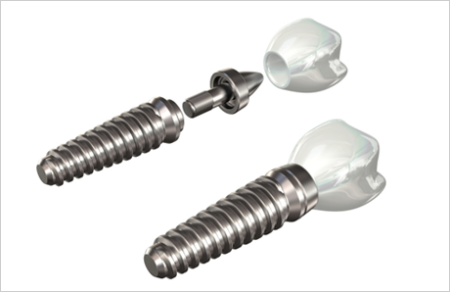
Dental implants can help you if you have any missing teeth, and wish to get them replaced.
Getting missing teeth replaced is extremely important, otherwise the rest of your teeth will fall out, and the unhealthy eating and chewing habits that result from lopsided eating can destroy the rest of your otherwise healthy teeth.
They can also change the appearance of your face, as missing teeth can create a sunken look to the face.
The smile is also greatly improved if all of the teeth are visible, and there are no gaps in it. But dental implants can also help you get rid of back, neck and jaw pains, as many of these are the result of unhealthy biting and chewing patterns.
Come in and have a consultation with one of our master dental implantologists, and see how dental implants can make a difference in your life. At the consultation session, the dentist will draw up a treatment plan that will itemise and individually price every single treatment, so that you can plan and allocate the budget for your dental implant treatment.
Please be aware that getting dental implants takes a couple of months, as there is a healing time after the dental implant is inserted into the jawbone.

The Alpha Bio dental implants cost is £2,499 (crown included).
The Nobel dental implants cost is £2,899 (crown included).
The Single tooth implant cost is from £2,499 (crown included).
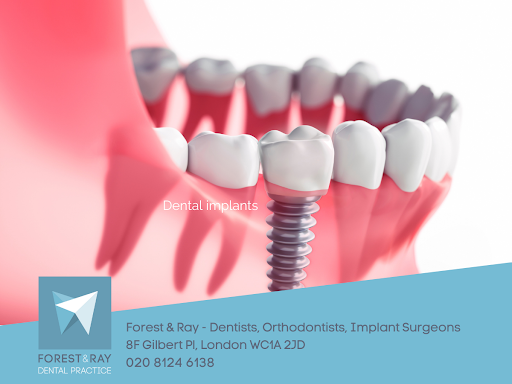
A dental implant is like a tooth root - albeit an artificial one - which supports a tooth or several teeth. It is a cylinder shaped metallic post - made of titanium alloy, to be exact - which has threads on one end. This post is screwed into the jaw bone at a carefully evaluated location and angulation. At the other end, which remains outside the jaw bone, an abutment is attached to the implant which supports a prosthesis. The abutment may be attached onto the exposed end of the implant like a small screw, or in case of mini-implants, it can be a ball structure pre-fitted to the implant. The screw and the abutment are not visible. Only the tooth, or teeth supported by the implants are visible. Teeth supported on implants get their support directly from the jaw bone through the metallic structure, and hence, are as firm. There is no question of the implant coming loose under normal eating conditions. So, now that you know what an implant is, let’s look at why they are so popular for missing teeth replacement.
In a matter of a few years only, dental implants have become very popular. They have pushed all other options including conventional dentures to the background, despite an appreciable difference in cost. This is not only due to any media campaign. Dental implant, in fact, have many merits which are not possessed by their alternatives such as dentures and bridges. I will discuss some of the major advantages of dental implants in the paragraphs below.
Are you wondering why dental implants are so durable and long lasting? This is due to the phenomenon of ossoeintegration. In the next pages, I will discuss how ossoeintegration plays a vital role in ensuring excellent stability, durability and retention of implant-supported prostheses.
The process of osseointegration is the real secret behind success of dental implants. Osseointegration is a natural process which is as important to success of the dental (and other implants) as the story of its discovery is interesting. Like many very useful scientific discoveries, the process of what we now call osseointegration also came to light by chance. It was in 1940, almost a century ago that Bothe and colleagues were experimenting with titanium as a prosthesis material for fractures in animal legs. They had chosen titanium for its strength and hardness. However, they noticed that the metal had a tendency to ‘fuse’ with the bone. Later, in 1951, Gottlieb Leventhal reported that the bonding of bone to titanium increased with passing time. In about four months the bonding was so strong that screws attached to the bones could not be removed without damaging the bone. The term “osseointegration” was later coined by Per-Ingvar Brånemark of Sweden who conducted further experiments with titanium objects in rabbit bones. In 1965, Gösta Larsson was the first human to receive a dental implant, again at the hands of Professor Brånemark. Since that time, osseointegration has been studied extensively. This property is also found in certain other materials, but as of 2016, titanium alloys are the preferred choice for dental implants and other surgical implants. The alloying is done to modify mechanical properties of titanium as desired.
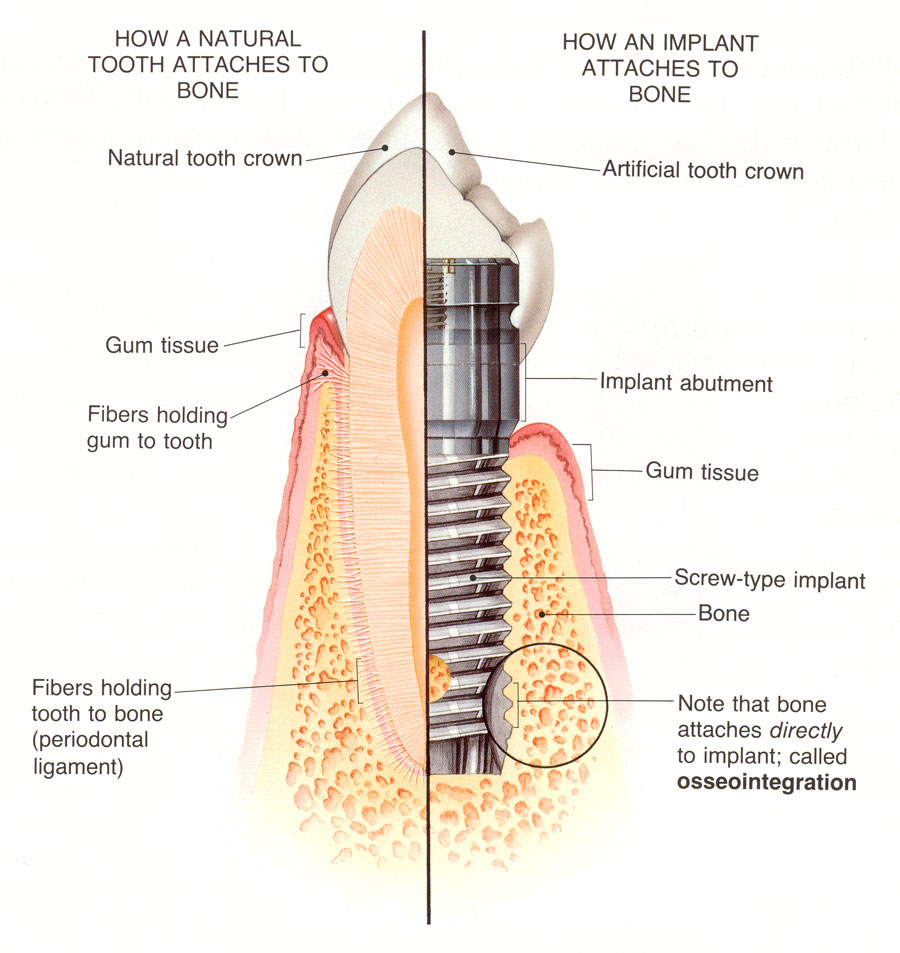
The process takes place automatically when a titanium object remains in contact with living bone. Bone cells grow onto the surface of the metal, and the bond is mature in three to six months. It is for this reason that in the routine implant placement procedures, dentists like to give a gap of about three to six months after installation of implants before a prosthesis is built over them. In the case when implants are loaded in a single day, the dentists advise patients not to load their implants with hard food initially. I shall discuss more about conventional and same day implant loading in more detail in the preceding chapters. Before that, let’s discuss who can benefit from dental implants?
This is a very important question. While most people will benefit from dental implants, some will not. The reason is that implants owe their strength and stability to a firm anchoring in the jaw bone. A very small percentage of people also have sensitivities which may cause problems. In case a patient does not have sufficient bone in the jaw at the location of the proposed implant, an implant is not advised. Similarly, quality of the bone matters. Diabetics and certain other categories may have bone density too low to support the implant along with its load. For this reason, your dentist will study your medical and dental history, and perform visual, radiographic and other tests to determine pre-hand whether implants are good for you.
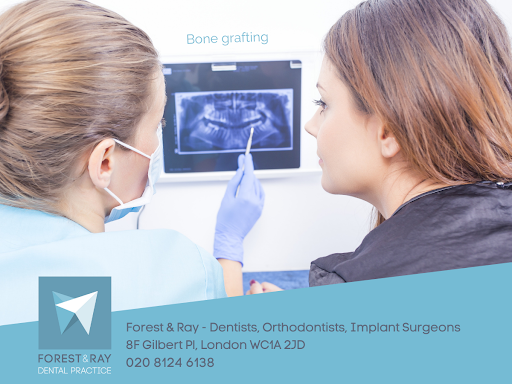 An important requirement for the placement of dental implants is the presence of sufficient thickness and volume of the jaw, so that it can support the implant as well as the prosthesis that is placed over it. When the jaw is deficient in bone or the quality is not good enough your dentist can still have options for you. I will discuss these options here very briefly.
An important requirement for the placement of dental implants is the presence of sufficient thickness and volume of the jaw, so that it can support the implant as well as the prosthesis that is placed over it. When the jaw is deficient in bone or the quality is not good enough your dentist can still have options for you. I will discuss these options here very briefly.
Bone augmentation: Bone can be augmented by placing bone grafting materials where required. The bone graft that is used to restore the quantity of the alveolar bone, can come from either human, animal or synthetic source. Here is a list of conditions which suggest you should not take an implant:
People often ask me this question. So, I thought why don’t I answer it in detail here? So here it goes! The cost of acquiring implants depends, among many other things, on the number of implants installed. It is an important term in the sum for cost of dental implant treatment. The number of implants required to support your teeth varies from case to case.
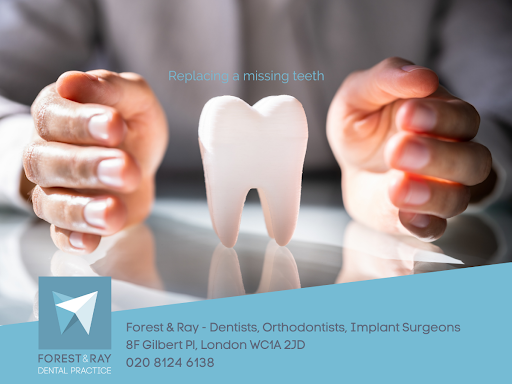 An important consideration is that the bone should have sufficient strength at the proposed locations of implants. If bone is found to be deficient in quality or quantity, it may have to be grafted from elsewhere. Both the volume and density of the both together determine the structural quality of the bone. Patients looking for implant dentures are often deficient in bone in many parts of their jaw. Exactly which places sufficient bone is available affects the planned location and the number of implants. In the case of the upper jaw, the number also depends on how many teeth you want to have there, and how many natural teeth are present on the lower jaw.
An important consideration is that the bone should have sufficient strength at the proposed locations of implants. If bone is found to be deficient in quality or quantity, it may have to be grafted from elsewhere. Both the volume and density of the both together determine the structural quality of the bone. Patients looking for implant dentures are often deficient in bone in many parts of their jaw. Exactly which places sufficient bone is available affects the planned location and the number of implants. In the case of the upper jaw, the number also depends on how many teeth you want to have there, and how many natural teeth are present on the lower jaw.
The decision as to how many implants are optimally required will be taken after a thorough examination. This examination can include a panoramic or a cone-beam x-ray, along with bone density tests. These tests will decide how many implants, and what type and size of implants are required. Their positions and angular orientation will also be carefully determined for optimal strength at minimal cost. The number of implants employed to support a denture could also be affected by your budget priorities.
This is again a very important and interesting question. Again, the answer depends on the condition of your teeth, how many teeth priorities, and the dentist involved. The cost will involve multiple components, and I shall discuss each of them in this chapter.
After the examination, the implant dentist will discuss with you all your various options which can accommodate your desires and your budget priorities. That is the time to discuss frankly with your implant specialist before making a final decision. I would recommend that you must also discuss with him or her the applicability of your insurance package, or any other question that comes to your mind regarding your treatment.
In my opinion, dental implants are the best option for replacing your missing teeth. In fact, dental implants are the latest dental replacements dentistry can offer. However, even though they function and feel just like natural teeth and do not suffer from the weaknesses of the other options, they are expensive and are not affordable by everyone. Although, as per my thinking dental implants are still quite cost effective in view of the quality of life they permit. If, for some reason you cannot be given implants, or you do not want to choose implants, I am discussing some of the other teeth replacement options that you can consider:
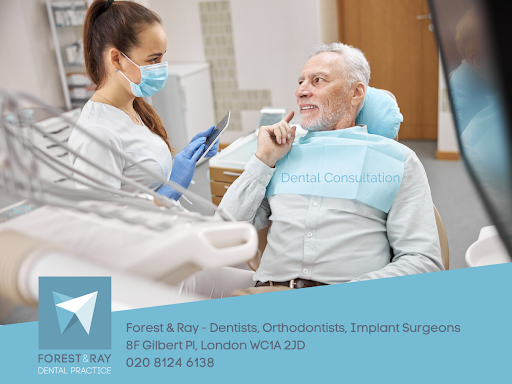 This is a very wise question. Just because everybody is going for implants is not a valid reason for a wise person to rush for dental implants. Dental implants mean a hefty investment of hard-earned money. You have to make a cold, calculated decision as to whether you want to go for dental implants or choose any of the other options we have discussed in the relevant chapter of this book. Dental implants are currently the latest option in tooth replacements that the dental profession can provide. In this chapter, we try to discuss both the merits and the demerits of implants as compared with the other tooth replacement options already available.
This is a very wise question. Just because everybody is going for implants is not a valid reason for a wise person to rush for dental implants. Dental implants mean a hefty investment of hard-earned money. You have to make a cold, calculated decision as to whether you want to go for dental implants or choose any of the other options we have discussed in the relevant chapter of this book. Dental implants are currently the latest option in tooth replacements that the dental profession can provide. In this chapter, we try to discuss both the merits and the demerits of implants as compared with the other tooth replacement options already available.
First, I start with the demerits of dental implants.
But the overall quality of life with dental implants is far superior to that obtainable with conventional restorations. Here are some of the reasons why people normally prefer, and I as well recommend dental implants over other types of dental restorations. These benefits more than offset the extra upfront cost of implants.
This question will be best answered after an implant dentist has examined you. He or she will look at the condition of your teeth, gums, and the jaw bone. Tests will be required to assess the condition of teeth and their roots under the gum, and the bone quality and mass. The dentist will then discuss with you the various options available. Depending on your functional and aesthetic requirements, budget priorities, and the insurance plan, you and your dentist can decide together. For your information, and to help you understand the dentist’s suggestions we describe below the various classes of implants and their applications briefly.
Implants can be classified according to three parameters: installation position (within or outside the jaw bone), size, and the purpose for which those are installed.
There are two main categories depending on the place they are installed in the jaw.
Implants can also be classified by sizes. The sizes are, in decreasing in decreasing order of size.
Implants are also classified by the type of restoration they are used for. The types are:
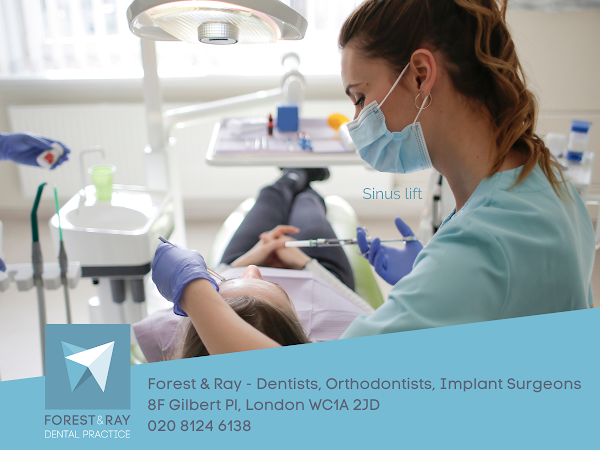 Implants are a lifetime facility. They incur a sizable expense, and a certain amount of inconvenience during the installation and healing process. Hence the installation process must be executed thoroughly with full preparation. For this purpose, you may have to undergo additional surgeries so that you derive a long and trouble-free service from your investment. Need for addition surgical procedures will vary from case to case. Additional surgery that you may have to pay for is of three types.
Implants are a lifetime facility. They incur a sizable expense, and a certain amount of inconvenience during the installation and healing process. Hence the installation process must be executed thoroughly with full preparation. For this purpose, you may have to undergo additional surgeries so that you derive a long and trouble-free service from your investment. Need for addition surgical procedures will vary from case to case. Additional surgery that you may have to pay for is of three types.
Implants can be used to replace a single tooth or all teeth in a jaw. And as I have already mentioned elsewhere in this E-book, implants can be employed to replace no teeth. That is the case when an orthodontist is trying to align your teeth and wants accelerated movement.
The minimum number of implants required depends on the number of teeth to be replaced. Replacement of one or two tooth requires just one implant. A greater number of teeth in adjacent locations can be replaced with a single fixed bridge using two implants. A full bridge replacement can be applied using four, six, or eight implants in the upper jaw, and five or more in the lower jaw. Note that not all 16 teeth are needed in a jaw, rather only 7 teeth in each jaw (28 in total) will suffice. Why we don’t we replace missing third molars? This is because third molars usually don’t play any active role in mastication and speech. Therefore, dentists do not usually replace them.
So, coming back to the question, you can replace as many teeth as you want to replace. If you need a single tooth replacement, you can get a crown. In case you need replacement more than two teeth, your dentist can give you a partial denture or a bridge. Finally, complete dentures can also be attached to implants for the replacement of all missing teeth in a jaw.
This is a very important question when you’re planning to get implants. Especially, when you have to travel abroad, or to another city, to get the implants, you may have plan well. It is a good idea to combine any foreign visit with a holiday, thus making the most of your money and time. So, it is best if you have an idea of how long the process can take, and what are the modalities.
Unfortunately, it is not possible for me or even for the dentist to give you a definite figure without proper and thorough examination of your mouth. However, if aesthetics is the primary concern, you may be able to smile with your new (may be temporary) teeth in under one hour. If the eating function is of primary importance, getting your beautiful teeth into full gear can take a few months-may be six months or more.
Why should it take that long? A full denture is obtained very quickly? The answer is that the very primar advantage of the implants lies in the firmness with which it is fixed to the jaw. The conventional denture simply sits on the gums, and therefore, can easily slip out. The implant becomes a part of your body just like a natural tooth, or may be even more firmly. Now if you were, God forbid, to break your arm, the bone would take weeks to heal. Your jaw bone is similar. In fact, the case of the metal implant in the jaw bone is even more difficult. While in a cracked bone, the two pieces to join back are natural complements of each other, in the case of an implant an integration process must take place between the bone and a foreign metallic object, the implant. It can take from three to six months. (please see the chapter on osseointegration). It is natural for an implant in the upper jaw to take a little longer due to the softer bone. The lower jaw bone is denser which usually speeds up the integration process.
What time frame to expect and how many visits will be needed, can only be decided after a detailed examination which will include 3-D imaging of the the jaw bones, and tests of bone quality. The dentist will also need to discuss your own desires and the budget priorities, including your insurance plans.
Modern dentistry practice does allow for “immediate implants” in some qualified cases. Such cases can walk away with new teeth (albeit temporary) in a matter of an hour after the examination and discussion of costs. The temporary teeth are later removed and replaced with permanent teeth. In some cases, even permanent teeth may be made ready using CAD-CAM equipment while you wait in the office. you can walk away with a new smile in just one visit which can spread over a few hours. Remember that even in these “immediate “cases, bone integration will still need time of a few months. Teeth must not be loaded before that.
The traditional procedure is multi-stage, involving two or more visits. It was the practice, after the detailed examination to go through the following procedures:
You can plan your visits after the examination. It will help you adjust your visits with your work or holidays.
Replacing a single tooth with an implant supported tooth is relatively simple procedure but must follow essentially the same procedural steps as replacing a greater number of teeth. Let me give you a brief overview of the steps involved in single tooth replacement with dental implants.
Prior to any such replacement efforts a good dentist will try and save the original tooth. Normally a replacement tooth cannot be as good as a natural tooth, even a restored one.
A thorough assessment examination is needed to determine whether the patient is fit for receiving an implant. The various tests normally conducted for this purpose include:
Treatment of current disease: If some treatment is needed, say for existing an gum or periodontal disease, that will be given before the implant procedure can be applied.
Removal of existing tooth: The bad tooth will be extracted, since it cannot be saved.
Bone augmentation: If tests have determined that the bone is deficient in the surrounding region, it must be augmented through a graft procedure. An autograft involves harvesting bone from own body and grafting at the desired location. Allograft means bone is taken from a tissue bank. Good quality bone will gradually replace the porous bone mass.
Soft tissue augmentation: While an implant is being planned it is a good consideration to see if gum flesh needs augmentation. Gum flesh must be sufficient to cover the implant. Else, it will present an un-aesthetic view.
Sinus Lift: In case a tooth in the upper jaw is to be replaced, tests may determine that a ‘sinus-lift ‘operation is required to increase the height of the upper jaw.
Tooth extraction: Once the bone graft and gum graft have matured and the flesh has healed, the bad tooth is extracted.
Implant and abutment placement: a hole is drilled very carefully into the jaw bone. The drill speed is controlled to avoid damaging bone cells. The hole is shaped, and in some cases tapped (if the implant is not self-tapping). The implant is the screwed in and the abutment applied.
Placement of the crown: In conventional practice, three to six months are allowed for osseointegration of the bone with the implant. However, current tendency is to apply the crown also at the same time. This one surgery of the gum. Immediate crowns will normally be replaced with permanent crowns later
Replacement of multiple teeth follows generally the same process as replacement of one tooth. However, if two adjacent teeth are required to be replaced they can be supported on a single implant. The entire set of teeth in a jaw can be supported on a minimum of four implants, while in some cases up to seven implants in the upper jaw and eight in the lower jaw may be required. The procedure can still be completed in a single day.
Yes! Modern dentistry has evolved procedures whereby you can get your implants in one single day. The implant provider needs to have all the necessary faculties in house for panoramic or cone beam x-rays, and bone density tests, and CAD / CAM for manufacturing the crowns, this is possible. This technique is known as single day or immediate implant loading.
During this process, a preformed prosthesis is immediately attached to the implant with the help of an abutment. In this way, the artificial tooth structure is completed, however, ossoeintegration continues simultaneously. Not every individual is a candidate for getting single day implants. Your dentist can tell whether you are eligible for getting dental implants loaded in a single day.
The first thing you can expect is an improved smile immediately after the procedure. Enjoy it, but a little care must be taken for best results. Before getting up and driving home, wait for the anesthesia to wear out completely. It is quite normal for some oozing of blood to take place after surgery. You can use cold packs or press on dry gauze pads to stop it. Avoid hot drinks for a while, and do not eat until anesthesia has worn off completely.
In the next two days avoid strenuous movements. A little bit of swelling is also normal and will at its peak in about two days. A little bit of warmth applied to the cheeks will help reduce it.
Slight pain is quite normal after surgery. Pain will increase when the anesthetic effect finishes. If necessary, take some over the counter pain killers. If pain and swelling do not subside and even increase after a few days, consult the implant specialist. Continue using any antibiotics that have been given you.
Keep the mouth as clean as possible. Continue using the mouth wash for at least a weak, and every time try to hold the liquid over the site of surgery for some time. Mouth rinses with warm saline water will also aid quick relief from swelling and pain.
Resume your daily brushing, but avoid the surgery sites until properly cured.
While eating avoid the sites of surgery, and rinse after food. Avoid smoking until the wounds heal.
After the wound has healed, and in about three to six months your implant will have firmly integrated with the bone around it. Now your teeth are like natural teeth. Enjoy life while maintain routine dental hygiene and six-monthly visits for inspection.
Once osseo-integrated, your implants are like your natural teeth. You need to observe routine dental hygiene, and ensure six monthly visits to the dentist for check-up. Sometimes a tightening may become necessary, but is not frequent. You can eat normal food , but it may be wise to avoid very hard stuff.
Here, I am providing you with the “golden list”. This is the list of things / procedures / investigations that you need to complete, before your implant placement process can be started. Your implant professional will generally follow a checklist like the one below. However, it can vary for each dental practitioner.
Yes of course. Click on our All-on-4 dental implants article to find out more about Nobel Biocare's All-on-four treatment concept!
I have tried to include everything that you need to know about dental implants. I hope that the information provided to you in this article is useful and you understand better what will be good for you. Please note that these are just guidelines. You should trust your dentist that, he or she will decide what’s best for you. The purpose of this post is to provide an overview of what dental implants are, how they work and how can they be used.

Our address is: 8F Gilbert Place, Holborn (next door to Bloomsbury), London, WC1A 2JD. About Camden: Lincoln's Inn Fields is a neighbourhood in the extreme south of the borough that is only 500 metres from the Thames. The northern part of the borough is home to Kentish Town, Hampstead, and Hampstead Heath, which are less populous districts. Numerous parks and open areas may be found in the London Borough of Camden. City of Westminster (near Soho, London) and the City of London are the next-door boroughs, followed by Brent to the west of what was once Roman Watling Street (now the A5 Road), Barnet and Haringey to the north, and Islington to the east. It encompasses all or a portion of the following postcode areas: N1, N6, N7, N19, NW1, NW2, NW3, NW5, NW6, NW8, EC1, WC1, WC2, W1, and W9.
The borough of Camden also includes Bloomsbury, known for its garden squares. To the west, the fashionable district of Marylebone is rich in shops and restaurants, while the prestigious Mayfair extends slightly into Camden. Covent Garden, famed for its entertainment and market, adds to Camden's vibrancy. Bordering the east of the borough are Clerkenwell and Farringdon, hubs for the design industry and renowned for their mix of old and new architecture. Although Lambeth and South Bank are located south of the Thames and not within Camden, they contribute to the broader cultural scene that Camden residents can easily access. To the east of Camden, beyond Islington, lies the diverse and bustling borough of Hackney, which provides a distinct cultural blend of its own. Wimpole Street and Harley Street (very close to Camden) are famous for the high number of private health care providers, especially dentists.